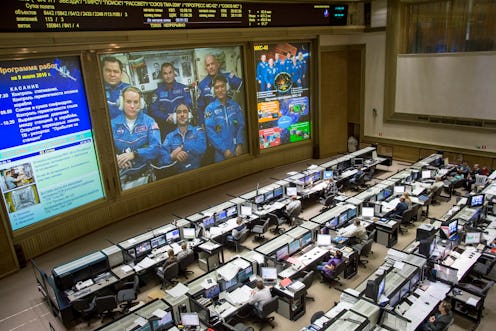News
Here’s What Trump Has In Store For The International Space Station (It's Not Good)

It's the largest and most intricate structure humans have ever placed in space. It's big enough and bright enough to be seen at night by humans, no telescope required. Fifteen countries have worked together over 20 years to construct it, piece by piece, and it currently serves as both a space laboratory and a launching pad for further missions. And still, President Trump wants to cut funding to the International Space Station (ISS).
According to The Verge, Trump's draft budget proposal slashes all American dollars to the ISS by the year 2025. Partner nations that also contribute to keeping the ISS up and running haven't yet announced if they, too, will walk away from the project. Based on current agreements, participating countries have committed to funding ISS through 2024.
Any budget proposal must pass Congress, and it's not yet clear that Trump's plan will be approved. However, the administration's signal that the ISS is no longer a priority likely will impact decisions both at NASA and at space programs abroad. Many congressional members of Congress seem at least open to moving funding away from the ISS, too.
Experts anticipate the ISS won't even be operational after 2028, so the question of what to do with the Earth-orbiting complex is pretty urgent. NASA is hoping to transition the funding and management of the ISS to commercial operators, but there's no guarantee that private space exploration companies will be equipped to do so on that timeline.
Trump has signaled he wants NASA to refocus on moon missions and hopes to have lunar landings by the early 2020s. Such projects require heavy investment, and the $3-4 billion spent annually on the ISS could be directed toward putting astronauts on the moon instead. Additionally, that money could be put to use towards one of NASA's own goals: putting a person on Mars.
Opting out of funding the ISS remains tricky, though. Besides international space partners, commercial companies use the space station too, and it functions as a destination for trial runs with their own rockets. At a congressional hearing in March, Eric Stallmer, the president of the Commercial Spaceflight Federation, made the case for keeping the ISS on its current funding plan through 2028. Stallmer said that without the ISS, his industry would "lose its outpost in space." He also said that fully private funding of the ISS was probably a no-go, arguing instead for a 50-50 split with NASA.
Some in Congress also are worried about how competition from China could be exacerbated by the U.S. abandoning the ISS too soon. China plans on launching its own low-Earth orbit station in 2023, big enough to accommodate six astronauts.
NASA has been hard at work in preparation to launch its own separate station, which it plans to put in the space around the Moon. But the agency won't be ready to do so for several years, which would mean that its astronauts could be totally grounded during the period between the end of U.S. funding to the ISS and the successful launch of the new station. Meanwhile, NASA is developing the Space Launch System, an enormous rocket that its designers hope will successfully take humans further into space than ever before.
Some view the two programs — low-Earth orbit stations and deep space exploration — as destined for budgetary fights. Since NASA has limited resources and space travel is very, very expensive, the agency is faced with the decision to prioritize projects like the ISS or else shoot for new space travel horizons. Of course, as Tim Fernholz points out at Quartz, Congress could choose to fund both ventures; but for now, it seems clear whose side Trump is on. And that's bad news for the ISS.